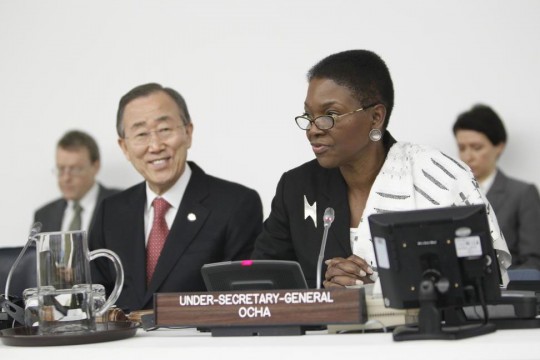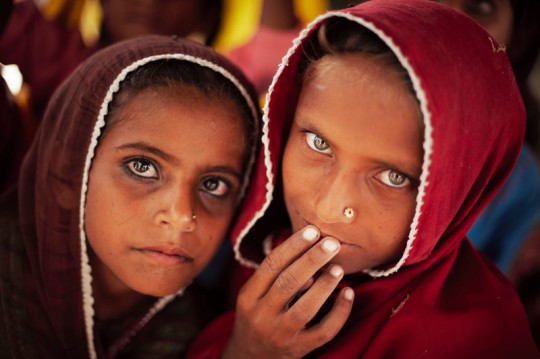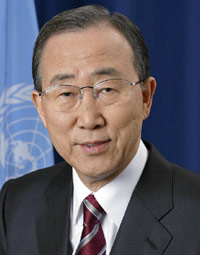Donors give nearly $375 million to UN emergency relief fund
Donors give nearly $375 million to UN emergency relief fund
 Secretary-General Ban Ki-moon (left) and Emergency Relief Coordinator Valerie Amos at the annual high-level conference on the Central Emergency Response Fund
Secretary-General Ban Ki-moon (left) and Emergency Relief Coordinator Valerie Amos at the annual high-level conference on the Central Emergency Response Fund
Donors pledged nearly $375 million today to the United Nations fund that ensures that humanitarian workers can quickly begin saving lives when a crisis strikes.
The Central Emergency Response Fund (CERF) has disbursed more than $2 billion in assistance since it was launched in 2006, making it the world’s largest source of humanitarian funding.
Managed by the UN Office for the Coordination of Humanitarian Affairs (OCHA), the fund has enabled the fast delivery of life-saving assistance to people affected by natural disasters and other crises in some 80 countries over the past five years.
It is flexible, and responsive to the needs of people. It provides a service, with low costs, that would otherwise not exist. And it has a clear, measurable impact.
“CERF is a United Nations success story,” Secretary-General Ban Ki-moon said at the start of the pledging conference held at UN Headquarters.
“It is flexible, and responsive to the needs of people. It provides a service, with low costs, that would otherwise not exist. And it has a clear, measurable impact.”
This year about $400 million has been disbursed by the fund to help some 29 million people across 45 countries, including for UN efforts to overcome the Horn of Africa crisis, the drought in Niger and the floods in Central America.
Mr. Ban noted that many, both in the developing and developed worlds, are facing financially difficult times, and it is essential that every dollar spent on humanitarian aid is spent to maximum effect.
“Money given to CERF is money well spent,” he told the representatives from governments, the private sector and civil society. “It is guaranteed to go to the people who need it most, in time to make a difference.”
Several Member States – including Afghanistan, Australia, Brazil, Denmark, Estonia, Germany, Indonesia, Norway, Sweden, the Republic of Korea (ROK) and the United Kingdom – announced increases to their 2012 pledges.
Denmark became one of the largest donors after it announced it would double its contribution to nearly $18 million. There were also two new donors, Uruguay and Niger, which brings the total number of donors to 46 countries.
In the last six years, a total of 126 States and observers, as well as some 30 public and private donors, have contributed to the fund.
“I thank Member States for their strong support, which underscores their continued belief in CERF, and will enable us to help even more people in need,” said Under-Secretary-General for Humanitarian Affairs and UN Emergency Relief Coordinator Valerie Amos, who also chaired the pledging conference.
###
CERF: Reaching 29 million people in 45 countries with life-saving aid in 2011
The annual Central Emergency Response Fund (CERF) pledging conference opened today at the UN headquarters in New York.
 Sisters displaced by the devastating floods in Pakistan’s Sindh Province in 2011. Credit: UNHCR/S. Phelps
Sisters displaced by the devastating floods in Pakistan’s Sindh Province in 2011. Credit: UNHCR/S. Phelps
Since its launch in 2006, CERF, which has an annual funding target of US$450 million, has enabled the fast delivery of life-saving humanitarian aid to millions of people affected by natural disasters and other crises in some 80 countries.
From Haiti to Central America, Niger to Somalia, Pakistan to the Philippines, some 29 million people in 45 countries have benefited from CERF’s distribution of more than $400 million in aid this year alone.
More>> CERF website
Watch the conference live on UN Webcast
Follow the conference live on twitter: @UNOCHA, @UNCERF and via hashtag #Help2gether
###

Ban Ki-moon
Secretary-General of the United Nations.
Ban Ki-moon is the eighth Secretary-General of the United Nations. His priorities have been to mobilize world leaders around a set of new global challenges, from climate change and economic upheaval to pandemics and increasing pressures involving food, energy and water. He has sought to be a bridge-builder, to give voice to the world’s poorest and most vulnerable people, and to strengthen the Organization itself.“I grew up in war”, the Secretary-General has said, “and saw the United Nations help my country to recover and rebuild. That experience was a big part of what led me to pursue a career in public service. As Secretary-General, I am determined to see this Organization deliver tangible, meaningful results that advance peace, development and human rights.”Mr. Ban took office on 1 January 2007. Highlights of his tenure have included:
Promoting sustainable development
One of the Secretary-General’s first major initiatives was the 2007 Climate Change Summit, followed by extensive diplomatic efforts that have helped put the issue at the forefront of the global agenda. Subsequent efforts to focus on the world’s main anti-poverty targets, the Millennium Development Goals, have generated more than $60 billion in pledges, with a special emphasis on Africa and the new Global Strategy on Women’s and Children’s Health. At the height of the food, energy and economic crises in 2008, the Secretary-General successfully appealed to the G20 for a $1 trillion financing package for developing countries and took other steps to guide the international response and protect the vulnerable and poor.
Empowering women
The Secretary-General pressed successfully for the creation of UN Women, a major new agency that consolidates the UN’s work in this area. His advocacy for women’s rights and gender equality has also included the “Unite to End Violence against Women” campaign, the “Stop Rape Now” initiative, the creation of a “Network of Men Leaders” and the establishment of a new Special Representative on Sexual Violence in Conflict. Within the UN itself, the Secretary-General has increased the number of women in senior management positions by more than 40 per cent, reaching the highest level in the Organization’s history.
Supporting countries facing crisis or instability
The Secretary-General has sought to strengthen UN peace efforts, including through the New Horizons peacekeeping initiative, the Global Field Support Strategy and the Civilian Capacity Review, a package of steps to improve the impact of the 120,000 United Nations “blue helmets” operating in the world’s conflict zones. A mediation support unit, along with new capacity to carry out the Secretary-General’s good offices, have been set up to help prevent, manage and resolve tensions, conflicts and crises. Accountability for violations of human rights has received high-level attention through inquiries related to Gaza, Guinea, Pakistan and Sri Lanka, legal processes in Lebanon and Cambodia, and advocacy for the “responsibility to protect,” the new United Nations norm aimed at prevent and halt genocide and other grave crimes. He has also sought to strengthen humanitarian response in the aftermath of mega-disasters in Myanmar (2008), Haiti (2010) and Pakistan (2010), and mobilized UN support for the democratic transitions in North Africa and the Middle East.
Generating new momentum on disarmament, arms control and non-proliferation
The Secretary-General has sought to rejuvenate the disarmament agenda through a five-point plan, efforts to break the deadlock at the Conference on Disarmament and renewed attention to nuclear safety and security in the aftermath of the tragedy at the Fukushima Daiichi Nuclear Power Plant.
Strengthening the UN
The Secretary-Generalhas introduced new measures aimed at making the United Nations more transparent, effective and efficient. These include heightened financial disclosure requirements, compacts with senior managers, harmonization of business practices and conditions of service, the adoption of International Public Sector Accounting Standards, and continued investments in information technology and staff development.
Personal
The Secretary-General was born in the Republic of Korea on 13 June 1944. He received a bachelor’s degree in international relations from Seoul National University in 1970. In 1985, he earned a master’s degree in public administration from the Kennedy School of Government at Harvard University.At the time of his election as Secretary-General, Mr. Ban was his country’s Minister of Foreign Affairs and Trade. His 37 years of service with the Ministry included postings in New Delhi, Washington D.C. and Vienna, and responsibility for a variety of portfolios, including Foreign Policy Adviser to the President, Chief National Security Adviser to the President, Deputy Minister for Policy Planning and Director-General of American Affairs.Mr. Ban’s ties to the United Nations date back to 1975, when he worked for the Foreign Ministry’s United Nations Division. That work expanded over the years, with assignments that included service as Chairman of the Preparatory Commission for the Comprehensive Nuclear Test Ban Treaty Organization and Chef de Cabinet during the Republic of Korea’s 2001-2002 presidency of the UN General Assembly. Mr. Ban has also been actively involved in issues relating to inter-Korean relations.The Secretary-General speaks English, French and Korean. He and his wife, Madam Yoo (Ban) Soon-taek, whom he met in high school in 1962, have one son, two daughters and three grandchildren. Since 2007, Mrs. Ban has devoted her attention to women’s and children’s health, including autism, the elimination of violence against women, and the campaign to prevent mother-to-child transmission of HIV/AIDS.
###
> United Nations (UN).
 The United Nations was established on 24 October 1945 by 51 countries committed to preserving peace through international cooperation and collective security. Today, nearly every nation in the world belongs to the UN: membership totals 192 countries.
The United Nations was established on 24 October 1945 by 51 countries committed to preserving peace through international cooperation and collective security. Today, nearly every nation in the world belongs to the UN: membership totals 192 countries.
When States become Members of the United Nations, they agree to accept the obligations of the UN Charter, an international treaty that sets out basic principles of international relations. According to the Charter, the UN has four purposes:
- to maintain international peace and security;
- to develop friendly relations among nations;
- to cooperate in solving international problems and in promoting respect for human rights;
- and to be a centre for harmonizing the actions of nations.
###
* The above story is adapted from materials provided by United Nations (UN)
** More information at United Nations (UN)



















